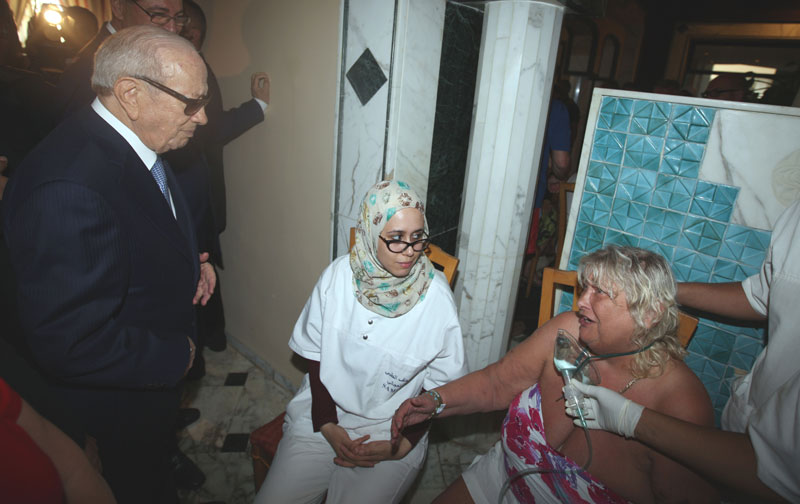Tunisia's president declares state of emergency after hotel attack
TUNIS: Tunisian President Beji Caid Essebsi declared a state of emergency on Saturday to give his government more powers following an Islamic militant attack on a beach hotel, where 38 foreign tourists, mostly Britons, were killed.
Tunisia's emergency law temporarily gives the government more executive flexibility, hands the army and police more authority, and restricts certain rights such as the right to public assembly.
The statement from the president's office said Essebsi would give a speech on national television with more details at 1600 GMT.
The attack on the Sousse beach resort last Friday followed a gun attack on the Bardo museum in Tunis in March - two of the worst militant assaults in Tunisia's modern history, and a pressing threat to its vital tourist industry.
Tunisian officials say all three gunmen in those two attacks had been trained at the same time, over the border in jihadist camps in Libya, where a conflict between two rival governments has allowed Islamist militant groups to gain ground.
Tunisia last had a state of emergency during the 2011 uprising against autocrat Zine el-Abidine Ben Ali.
In reaction to militant recruiters, the government says it will close 80 mosques that are operating illegally or preaching extremist messages.
Tunisian authorities believe militant group Ansar al-Sharia is responsible for orchestrating the attack against the Sousse hotel, which prompted thousands of tourists to leave Tunisia and is expected to cause $500 million in losses to the sector.
Islamic State militants, though, have claimed the massacre on the Imperial Marhaba hotel a week ago when the gunman shot tourists as they sat at the beach and pool in the worst such militant attack in the country's modern history.
Ansar al-Sharia, an al-Qaeda linked organisation, was blamed for the storming of the U.S. embassy in Tunis in 2012 and the assassination of two Tunisian opposition leaders. But it has mostly disbanded and its hardline militants left to fight overseas in Iraq, Syria and Libya.
"For the moment, this was Ansar al-Sharia who were behind this," said the Tunisian security source.
Islamic State also claimed the Bardo attack, but the government said it was linked to local Okba Ibn Nafaa brigade.
Tunisian officials say all three gunmen in those two attacks had been trained at the same time over the border in jihadist camps in Libya, where a conflict between two rival governments has allowed Islamist militant groups to gain ground.
While Ansar al-Sharia and Okba Ibn Nafaa are tied to the al-Qaeda franchise, just as in other regions, experts say younger fighters and recruits may be breaking away inspired more by the recent victories and propaganda of Islamic State.
(Updated)
----
Tunisian leader calls state of emergency
Associated Press
TUNIS: Tunisia's president declared a state of emergency on Saturday, more than a week after a gunman at a popular resort attacked foreign tourists on the beach, killing 38 people.
It was not immediately clear why President Beji Caid Essebsi decided to declare the state of emergency, or what it would entail. The state news agency said the president would address the nation later in the day.
Thirty of the 38 dead in the Tunisian resort of Sousse were British tourists.
The gunman was killed by police and the Islamic State group claimed responsibility for the massacre, a blow to Tunisia's budding democracy and tourism industry.
Tunisia's government has promised new laws to increase police powers and provide for harsher penalties for terrorism convictions. Immediately after the attack, the prime minister pledged to post armed guards at tourist sites and close mosques outside government control.






